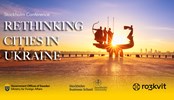Ina Ganguli wins Russian National Award in Applied Economics
The prestigious Russian National Award in Applied Economics was established in 2009. It is given once every two years for outstanding published papers on the Russian economy at the country, industry, regional, or company level. The main purpose of the award is to identify works of high importance to the development of academic research and economics education in Russia, as well as to the increased efficiency of the Russian economy and economic policy.
This year’s winner, Ina Ganguli, has been part of SITE’s affiliated faculty since 2015. She is an Assistant Professor of Economics at the University of Massachusetts Amherst and a core Faculty Member of the UMass Computational Social Science Institute. She was awarded the prize for her outstanding articles devoted to analysing the productivity of Russian scientists in the 1990s, as well as their decisions on emigration and the impact of emigration on the diffusion of Russian science in the United States.
The prize ceremony will take place today, on April 11, as part of the XIX April International Academic Conference on Economic and Social Development.
Read the nominated articles by Ina Ganguli:
1. Saving Soviet Science: The Impact of Grants When Government R&D Funding Disappears
2. Immigration and Ideas: What Did Russian Scientists “Bring” to the United States?
3. Who Leaves and Who Stays? Evidence on Immigrant Selection from the Collapse of Soviet Science



